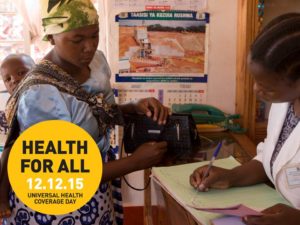 By Francis Aboagye-Nyame, Program Director, SIAPS
By Francis Aboagye-Nyame, Program Director, SIAPS
Three years ago, the United Nations unanimously passed a resolution that endorsed the concept of universal health coverage. The USAID-funded SIAPS Program, along with hundreds of other partners in the global health community, now marks that landmark commitment by commemorating each December 12th as Universal Health Coverage Day.
This UHC Day, we join the global coalition of partners in celebrating many hard wrought achievements—most notably the inclusion of UHC in the newly launched Sustainable Development Goals (SDGs)—but we are also looking ahead to the challenges of making UHC a reality.
Our work to strengthen pharmaceutical systems in low- and middle-income countries is built around an approach which emphasizes sustainability, strengthened local capacity, and lasting changes in the systems which support greater access to medicines and related services. We believe that the same trademarks will be needed to make health—and medicines—for all a reality. In fact, we are already seeing how this type of approach is paying off countries across the globe where major strides are being taken toward UHC.
Enabling Systems to Manage Increases in Coverage
In Ghana, the National Health Insurance Scheme (NHIS) is working to expand the coverage and quality of health services, but challenges still remain, especially in how medicines are covered by the NHIS. The coverage of medicines within a health insurance plan is usually referred to as a medicines benefit program. To help NHIS address issues around medicines selection, reimbursement and payment policies, and medicines stock-outs as a result of increased demand, SIAPS developed and piloted a new assessment tool to conduct a thorough qualitative and quantitative analysis and developed a set of data-driven recommendations. The NHIS will be using these recommendations to address gaps in program coverage, expand its services to new populations, and achieve long-term solvency. The assessment tool has also been used to review medicines benefit programs in South Africa and Namibia as well.
Making Existing Resources Stretch Further
In addition to strengthening medicines benefit programs, greater access to medicines and health services can also be achieved by ensuring that existing resources are used judiciously. In the Dominican Republic, for example, SIAPS was able to support government stakeholders and program managers in evaluating a new, more competitive supplier for ARVs which, along with other cost saving strategies, helped to close an anticipated $2.5 million gap in the amount budgeted for antiretroviral treatment programs.
Additionally, a recent SIAPS assessment of high-cost medicines in the Dominican Republic showed that the cost of these medicines had tripled over the course of two years and was double the budgeted amount for all other medicines. By revising the list of high-cost medicines that needed to be procured, SIAPS helped to reduce the budget for these medicines by $62 million (USD).
Expanding Access while Ensuring Rational Medicines Use
As countries move to make medicines available and accessible to all, putting in place mechanisms to ensure that they are used rationally will be critical. Rational medicines use happens when patients receive medicines appropriate to their clinical needs, in doses that meet their individual requirements, for an adequate amount of time, and at the lowest cost possible cost to the patient and community.
Given the interrelated and dynamic factors between patient, provider, and the larger regulatory and policy environments which affect how medicines are procured, prescribed, dispensed, and used; ensuring medicines are used rationally requires multifaceted, cross-cutting interventions which improve not only patient and provider behavior but also strengthen the associated components of the health system as a whole. One key way SIAPS has helped promote long-term rational use of medicines is by supporting seven countries to develop or revise national essential medicines lists which help to prioritize the selection, procurement, and use of medicines.
Additionally, the overuse and misuse of medicines fuels the development and spread of antimicrobial resistance (AMR) which makes treating diseases like malaria and tuberculosis increasingly difficult and more expensive. Recognizing the importance of curbing the spread of AMR through rational medicines use, SIAPS works to implement a set of key interventions that work to address the many interconnected causes of AMR and has implemented AMR-related activities in nearly 20 countries
Monitoring Medicines Use: Systems for continued safety and effectiveness
As governments and partners work to increase access to medicines, we also must ensure that the systems to monitor the continued safety and effectiveness of medicines are in place. Known as pharmacovigilance, these activities are critically important to ensure that medicines can be used over a prolonged period of time, in conjunction with other medicines, among new patient populations, and in patients with multiple illnesses.
SIAPS supports countries in establishing or strengthening monitoring and reporting systems which not only report safety concerns but also facilitate the use of this data for regulatory decision-making. To help make collection of pharmacovigilance data in low- and middle-income countries easier, SIAPS recently launched the Pharmacovigilance Monitoring System (PViMS) which is the only free software of its kind customized for low-resource settings. With PViMS, regulatory authorities, program managers, physicians, and pharmacists have a tool which helps to ensure that the medicines they provide to mothers and their children are not only safe and effective, but also help them attain the best possible health outcomes.
Standing on Strong Systems to Reach #HealthforAll
The UHC movement continues to grow, with a global network of partners now all committed to working toward health for all. This momentum is already translating to progress at the country level. As we join partners in continuing to make access to health services and medicines a reality to every person, everywhere, we recognize that only through investments in strong health systems will the progress toward UHC be sustainable, equitable, and locally led.

